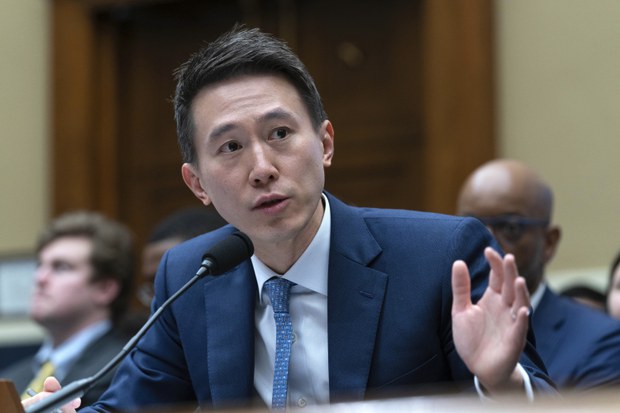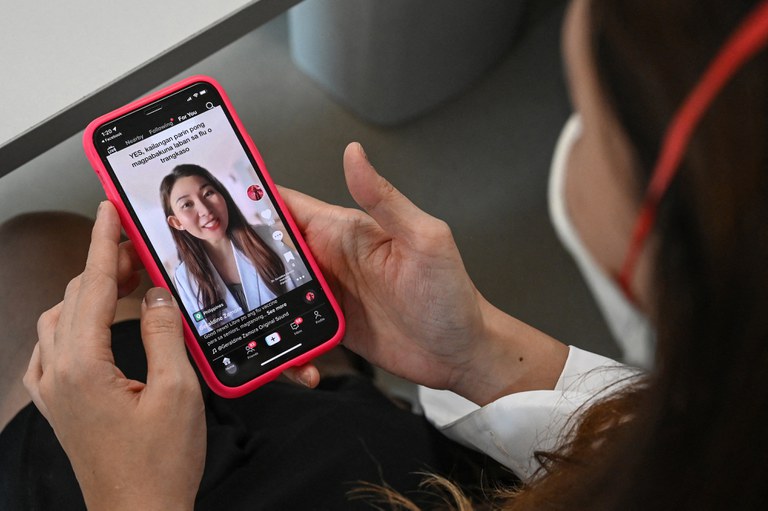Philippines considers banning TikTok for security workers to block app from cyberspying
2023.09.20
Manila
 TikTok CEO Shou Zi Chew testifies before the U.S. House Energy and Commerce Committee in Washington, March 23, 2023.
TikTok CEO Shou Zi Chew testifies before the U.S. House Energy and Commerce Committee in Washington, March 23, 2023.
The Philippines has set up a task force to study a possible ban on government security employees using Chinese-owned platform TikTok to block the app’s potential for cyberespionage, a National Security Council official said Wednesday.
The ban is also being considered to ensure the app is not used as a propaganda tool, Jonathan Malaya, assistant director general at the NSC, told a local television channel, amid growing concern about TikTok’s risks and heightened tensions between Manila and Beijing over the South China Sea.
“The reason for this proposal [to ban TikTok] is two-fold. Number one, is the threat of data collection or cyber espionage … and number two, the possible use of TikTok as a social influence tool,” Malaya said.
“You know through algorithms you can affect civic discourse, so it is on that basis that we’re making the study and we hope we finish soon.”
The task force includes the National Intelligence Coordinating Agency, the military, and the Department of Information and Communication Technology. It will determine whether TikTok is being used to gather crucial intelligence information, Malaya said.
TikTok is owned by Beijing-based ByteDance Ltd., and under Chinese law, all Chinese companies have to cooperate with their government, the NSC official noted.
The task force was looking into the proposal to ban government security workers from using TikTok “as a proactive step to ensure the security of our security personnel,” Malaya said.
The United States, Canada and the European Commission previously banned the social media platform from government staff phones and devices to protect data and over national security concerns.
In November, the U.S. Federal Bureau of Investigation director said the agency was concerned that the Chinese government could use TikTok to manipulate data for the purpose of spreading propaganda, and China's ruling Communist Party could gather personal information and vital intellectual property.

NSC’s Malaya said during the television interview that the government’s security sector had suggested civilians, including public school teachers and other state employees, also not be allowed to use TikTok.
“For example, it’s been suggested that the Bureau of Immigration should also be covered by the ban … [and other] individuals, for example, from the National Bureau of Investigation, who are in law enforcement,” Malaya said.
“We’re starting with the security sector and maybe [will] expand [it], depending on what the study reveals [about] the possibility of TikTok being a tool for data collection or cyberespionage.”
TikTok CEO Shou Zi Chew has denied the social media app has links to the Chinese Communist Party.
Appearing before the U.S. House Energy and Commerce Committee in March, he said the company’s Beijing-based parent ByteDance is not owned or controlled by the Chinese government, reported Radio Free Asia, a news site affiliated with BenarNews.
“We do not promote or remove content at the request of the Chinese government. …It is our commitment to this committee and all our users that we will keep [TikTok] free from any manipulation by any government,” Chew said according to other media reports.
But Winthrop Yu, chairman emeritus and acting spokesman of the Internet Society Philippine Chapter, said he doubted TikTok could ignore any demands from Beijing.
“TikTok has no choice but to surrender all their accumulated information to Chinese security services,” he was quoted as saying in a Sept. 11 report by the state-run Philippine News Agency.
“All phone apps are dangerous and represent a security risk, particularly if the app maker is subservient to its government.”
Meanwhile, armed forces spokesman Col. Medel Aguilar told BenarNews the military had put in place measures to protect against spyware disguised as harmless applications.
“There is a policy already on the use of social media platforms to make sure the security of the organization is not exposed and the credibility of the armed forces is not also compromised,” Aguilar said.
He said military personnel have been given strict guidelines on the use of social media.
“The observance of communication and operational security is emphasized,” Aguilar said.
“We will support this plan of the National Security Council.”
Jeoffrey Maitem in Manila contributed to this report.







